初中英语现在完成时讲解练习及答案
(英语)初中英语现在完成时解题技巧及经典题型及练习题(含答案)及解析
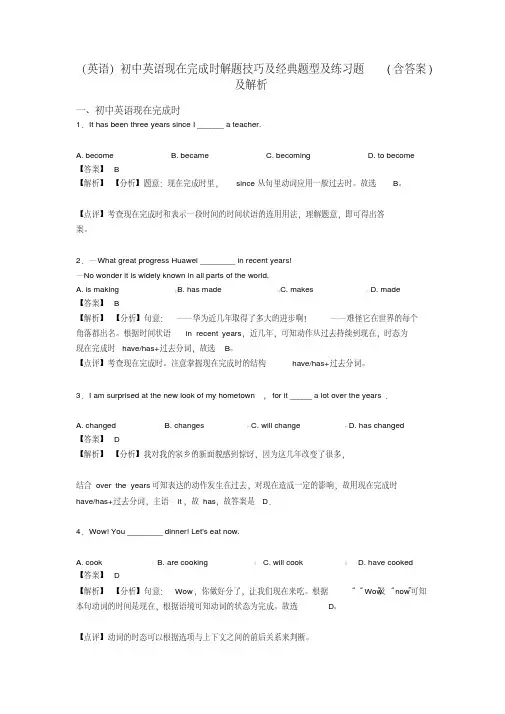
(英语)初中英语现在完成时解题技巧及经典题型及练习题(含答案)及解析一、初中英语现在完成时1.It has been three years since I ______ a teacher.A. becomeB. becameC. becomingD. to become 【答案】 B【解析】【分析】题意:现在完成时里,since从句里动词应用一般过去时。
故选B。
【点评】考查现在完成时和表示一段时间的时间状语的连用用法,理解题意,即可得出答案。
2.—What great progress Huawei ________ in recent years!—No wonder it is widely known in all parts of the world.A. is makingB. has madeC. makesD. made【答案】 B【解析】【分析】句意:——华为近几年取得了多大的进步啊!——难怪它在世界的每个角落都出名。
根据时间状语in recent years,近几年,可知动作从过去持续到现在,时态为现在完成时have/has+过去分词,故选B。
【点评】考查现在完成时。
注意掌握现在完成时的结构have/has+过去分词。
3.I am surprised at the new look of my hometown,for it _____ a lot over the years.A. changedB. changesC. will changeD. has changed【答案】 D【解析】【分析】我对我的家乡的新面貌感到惊讶,因为这几年改变了很多,结合over the years可知表达的动作发生在过去,对现在造成一定的影响,故用现在完成时have/has+过去分词,主语it,故has,故答案是D.4.Wow! You ________ dinner! Let's eat now.A. cookB. are cookingC. will cookD. have cooked【答案】 D【解析】【分析】句意:Wow,你做好分了,让我们现在来吃。
人教新目标初中英语语法-现在完成时讲解以及练习题(含答案)
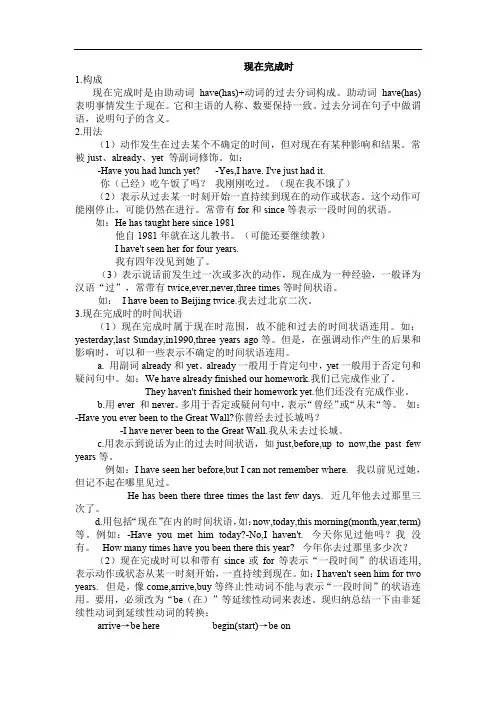
现在完成时1.构成现在完成时是由助动词have(has)+动词的过去分词构成。
助动词have(has)表明事情发生于现在。
它和主语的人称、数要保持一致。
过去分词在句子中做谓语,说明句子的含义。
2.用法(1)动作发生在过去某个不确定的时间,但对现在有某种影响和结果。
常被just、already、yet 等副词修饰。
如:-Have you had lunch yet? -Yes,I have. I've just had it.你(已经)吃午饭了吗?我刚刚吃过。
(现在我不饿了)(2)表示从过去某一时刻开始一直持续到现在的动作或状态。
这个动作可能刚停止,可能仍然在进行。
常带有for和since等表示一段时间的状语。
如:He has taught here since 1981他自1981年就在这儿教书。
(可能还要继续教)I have't seen her for four years.我有四年没见到她了。
(3)表示说话前发生过一次或多次的动作,现在成为一种经验,一般译为汉语“过”,常带有twice,ever,never,three times等时间状语。
如:I have been to Beijing twice.我去过北京二次。
3.现在完成时的时间状语(1)现在完成时属于现在时范围,故不能和过去的时间状语连用。
如:yesterday,last Sunday,in1990,three years ago等。
但是,在强调动作产生的后果和影响时,可以和一些表示不确定的时间状语连用。
a. 用副词already和yet。
already一般用于肯定句中,yet一般用于否定句和疑问句中。
如:We have already finished our homework.我们已完成作业了。
They haven't finished their homework yet.他们还没有完成作业。
b.用ever 和never。
中考英语复习——现在完成时练习含答案
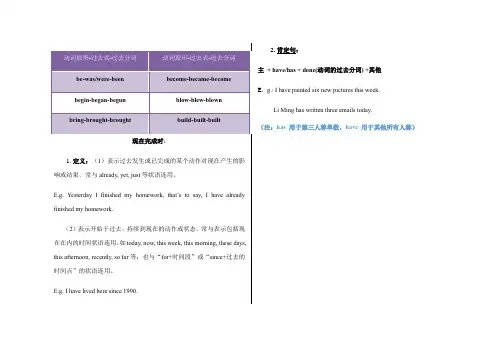
2.肯定句:主+ have/has + done(动词的过去分词) +其他E.g.: I have painted six new pictures this week.Li Ming has written three emails today.(注:has 用于第三人称单数,have 用于其他所有人称)常见动词的过去分词:3.否定句:主+hav e/has + not + done(动词的过去分词) +其他注:have not=haven’t has not= hasn’tE.g. I haven’t read the book yet.My aunt hasn’t lived in China for 3 years.4.一般疑问句:表示过去发生的某一动作I have seen this film.(强调对现在的影响,电影的内容已经知道了。
)She has returned from Paris.(她已从巴黎回来了。
)She returned yesterday.(她是昨天回来的。
)He has been in the Party for three years.(在团内的状态可延续)He joined the Party three years ago.( 三年前入党,joined为短暂行为。
)★When常与与一般过去时连用,How long常与与现在完成时连用----When did you come to Beijing? ----Two days ago/ Last week.----How long have you been in Beijing? ----For two days/ since two days ago.一、选择题。
( )1.It’s nice to see you again. We each other since 2014.A. won’t seeB. don’t seeC. haven’t seenD. didn’t see( )2. My mother a good example for me since I was young.A. wasB. has beenC. will beD. is( )3.—When will A bite of China begin tonight?—It for ten minutes.A. will beginB. has begunC. will be onD. has been on( )4.By the end of last week, she in the west of China for two months helping the homeless children.A.will stayB. has stayedC. would stayD. hadstayed5.—A new shop for a week nearby. Let’s have a look there.—Good idea. But it doesn’t on Mondays.A.opened; openedB. has been opened; openB.has opened; opened D. has been open; openCBDDD二、填空题1.—you (clean) the classroom?—Yes, we (do) that already.2.How many times you (be) there?3.I (read) the novel twice. It’s interesting.4.Mr. Chen (give) up smoking last year.5.Mr. Chen (give) up smoking since last year.1.Have; cleaned; have done2. have; been3. have read4. gave5. has given三、用have/has been (to)和have/has gone (to)填空1. Mum is not at home now. She has gone to to the shop.2. —Have you ever been to Sanya? —Never.3. —Where is Jim? —He has gone to Wuhan.四、用since或for填空1. for two years2. since two years ago3. since last month4. since 19995. since yesterday6. since 4 o’clock7. for 4 hours 8. since an hour ago9. I’ve known him since we are children.10. Our teacher has studied Japanese for three years.五、英汉互译及句型转换。
【英语】英语现在完成时解题技巧讲解及练习题(含答案)含解析
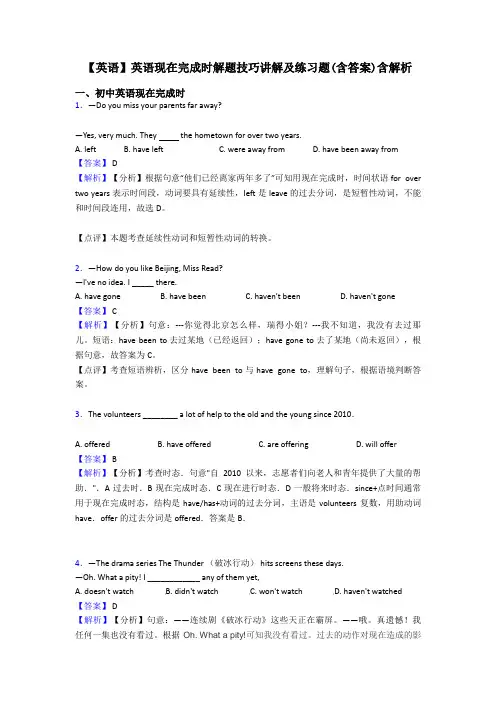
【英语】英语现在完成时解题技巧讲解及练习题(含答案)含解析一、初中英语现在完成时1.—Do you miss your parents far away?—Yes, very much. They the hometown for over two years.A. leftB. have leftC. were away fromD. have been away from【答案】 D【解析】【分析】根据句意“他们已经离家两年多了”可知用现在完成时,时间状语for over two years 表示时间段,动词要具有延续性,left是 leave的过去分词,是短暂性动词,不能和时间段连用,故选D。
【点评】本题考查延续性动词和短暂性动词的转换。
2.—How do you like Beijing, Miss Read?—I've no idea. I _____ there.A. have goneB. have beenC. haven't beenD. haven't gone【答案】 C【解析】【分析】句意:---你觉得北京怎么样,瑞得小姐?---我不知道,我没有去过那儿。
短语:have been to去过某地(已经返回);have gone to去了某地(尚未返回),根据句意,故答案为C。
【点评】考查短语辨析,区分have been to与have gone to,理解句子,根据语境判断答案。
3.The volunteers ________ a lot of help to the old and the young since 2010.A. offeredB. have offeredC. are offeringD. will offer【答案】 B【解析】【分析】考查时态.句意"自2010以来,志愿者们向老人和青年提供了大量的帮助.".A过去时.B现在完成时态.C现在进行时态.D一般将来时态.since+点时间通常用于现在完成时态,结构是have/has+动词的过去分词,主语是volunteers复数,用助动词have.offer的过去分词是offered.答案是B.4.—The drama series The Thunder (破冰行动) hits screens these days.—Oh. What a pity! I ____________ any of them yet,A. doesn't watchB. didn't watchC. won't watchD. haven't watched【答案】 D【解析】【分析】句意:——连续剧《破冰行动》这些天正在霸屏。
英语现在完成时答题技巧及练习题(含答案)及解析
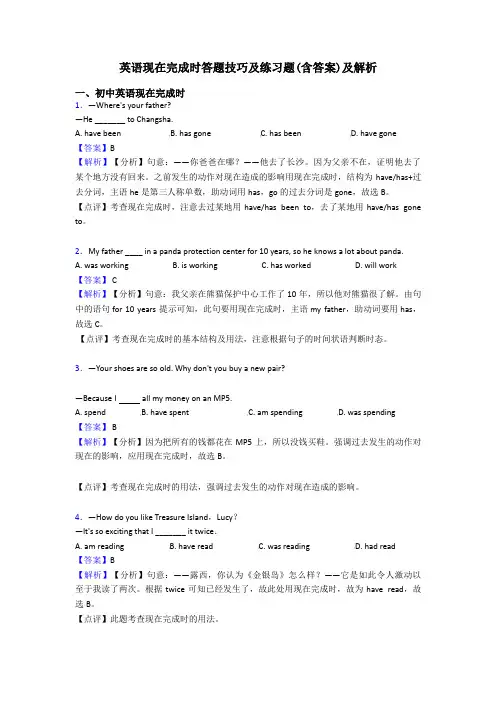
英语现在完成时答题技巧及练习题(含答案)及解析一、初中英语现在完成时1.—Where's your father?—He _______ to Changsha.A. have beenB. has goneC. has beenD. have gone【答案】B【解析】【分析】句意:——你爸爸在哪?——他去了长沙。
因为父亲不在,证明他去了某个地方没有回来。
之前发生的动作对现在造成的影响用现在完成时,结构为have/has+过去分词,主语he是第三人称单数,助动词用has,go的过去分词是gone,故选B。
【点评】考查现在完成时,注意去过某地用have/has been to,去了某地用have/has gone to。
2.My father ____ in a panda protection center for 10 years, so he knows a lot about panda.A. was workingB. is workingC. has workedD. will work【答案】 C【解析】【分析】句意:我父亲在熊猫保护中心工作了10年,所以他对熊猫很了解。
由句中的语句for 10 years 提示可知,此句要用现在完成时,主语my father,助动词要用has,故选C。
【点评】考查现在完成时的基本结构及用法,注意根据句子的时间状语判断时态。
3.—Your shoes are so old. Why don't you buy a new pair?—Because I all my money on an MP5.A. spendB. have spentC. am spendingD. was spending【答案】 B【解析】【分析】因为把所有的钱都花在MP5上,所以没钱买鞋。
强调过去发生的动作对现在的影响,应用现在完成时,故选B。
【点评】考查现在完成时的用法,强调过去发生的动作对现在造成的影响。
(完整版)初中英语现在完成时练习题及答案
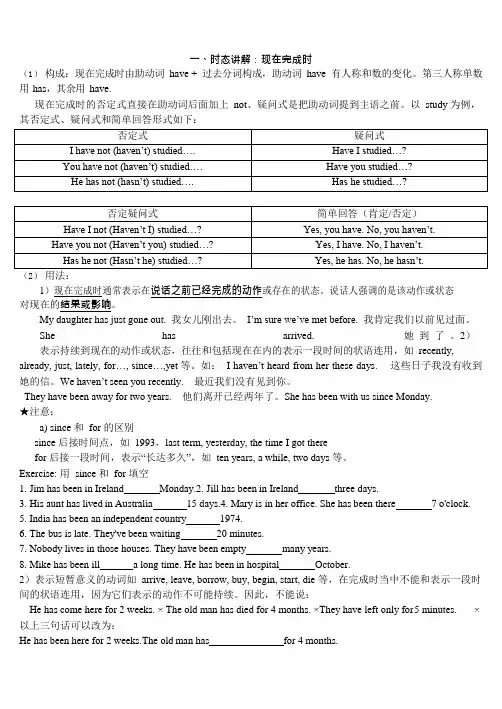
一、时态讲解:现在完成时(1)构成:现在完成时由助动词have + 过去分词构成,助动词have 有人称和数的变化。
第三人称单数用has,其余用have.现在完成时的否定式直接在助动词后面加上not、疑问式是把助动词提到主语之前。
以study 为例,其否定式、疑问式和简单回答形式如下:(2)1)现在完成时通常表示在说话之前已经完成的动作或存在的状态。
说话人强调的是该动作或状态对现在的结果或影响。
My daughter has just gone out. 我女儿刚出去。
I’m sure we’ve met before.我肯定我们以前见过面。
She has arrived. 她到了。
2)表示持续到现在的动作或状态,往往和包括现在在内的表示一段时间的状语连用,如recently, already, just, lately, for…,since…,yet等。
如:I haven’t heard from her these days. 这些日子我没有收到她的信。
We haven’t seen you recently. 最近我们没有见到你。
They have been away for two years. 他们离开已经两年了。
She has been with us since Monday.★注意:a) since 和for 的区别since 后接时间点,如1993,last term, yesterday, the time I got therefor 后接一段时间,表示“长达多久”,如ten years, a while, two days 等。
Exercise: 用since 和for 填空1. Jim has been in Ireland Monday.2. Jill has been in Ireland three days.3. His aunt has lived in Australia 15 days.4. Mary is in her office. She has been there 7 o'clock.5.India has been an independent country 1974.6.The bus is late. They've been waiting 20 minutes.7.Nobody lives in those houses. They have been empty many years.8.Mike has been ill a long time. He has been in hospital October.2)表示短暂意义的动词如arrive, leave, borrow, buy, begin, start, die 等,在完成时当中不能和表示一段时间的状语连用,因为它们表示的动作不可能持续。
英语现在完成时题20套(带答案)含解析
英语现在完成时题20套(带答案)含解析一、初中英语现在完成时1.His cat has ________ for five weeks.A. diedB. been deadC. dyingD. dies【答案】 B【解析】【分析】句意:他的猫已经死了5个星期了。
die是短暂性动词,不能表示状态的延续。
由时间状语 for five weeks可知应用延续性动词,故答案选B。
【点评】考查现在完成时。
2.My father ____ in a panda protection center for 10 years, so he knows a lot about panda.A. was workingB. is workingC. has workedD. will work【答案】 C【解析】【分析】句意:我父亲在熊猫保护中心工作了10年,所以他对熊猫很了解。
由句中的语句for 10 years 提示可知,此句要用现在完成时,主语my father,助动词要用has,故选C。
【点评】考查现在完成时的基本结构及用法,注意根据句子的时间状语判断时态。
3.I am surprised at the new look of my hometown,for it _____ a lot over the years.A. changedB. changesC. will changeD. has changed【答案】 D【解析】【分析】我对我的家乡的新面貌感到惊讶,因为这几年改变了很多,结合over the years可知表达的动作发生在过去,对现在造成一定的影响,故用现在完成时have/has+过去分词,主语it,故has,故答案是D.4.I scared of dogs ever since a dog hurt me when I was five years old.A. will beB. wasC. have beenD. would be【答案】 C【解析】【分析】由since引导的从句可知主句应用现在完成时,故答案为C。
英语初中英语现在完成时学习试题有答案及解析
〔英语〕初中英语现在完成时试题( 有答案和解析 )一、初中英语现在完成时1.This museum here for over 80 years. It one of the oldest buildings in this city.A. is; wasB. had been; isC. was; has beenD. has been; is【答案】D【解析】【分析】考查动词的时态。
句意:博物馆在这儿有八十多年了。
它是这座城市最古老的建筑之一。
前句表示从过去一直延续到现在的状态,用现在完成时态;后句表示的是现在的状态,用一般现在时态。
应选D。
2.I am surprised at the new look of my hometown,for it _____ a lot over the years.A. changedB. changesC. will changeD. has changed【答案】D【解析】【分析】我对我的家乡的新面貌感到惊讶,因为这几年改变了很多,结合 over the years 可知表达的动作发生在过去,对现在造成一定的影响,故用现在完成时have/has+过去分词,主语 it ,故 has,故答案是 D.3.—Lucy, is your uncle a teacher?—Yes, he is. He history for nearly 20 years.A. teachesB. has taughtC. is teachingD. will teach 【答案】 B【解析】【分析】句意:——露西,你叔叔是老师吗?——是的,他是。
他教历史将近20年了。
根据句中的时间状语 for nearly 20 years ,可知,表示持续一段时间的动作,用现在完成时, have/has+过去分词。
主语是 he,用 has,应选 B.【点评】考查现在完成时,注意其常与for+ 一段时间连用。
(英语)英语现在完成时练习题及答案及解析
(英语)英语现在完成时练习题及答案及解析一、初中英语现在完成时1.The Greens many places of interest since two years ago.A. has visitedB. have visitedC. visitedD. will visit【答案】 B【解析】【分析】句意:自两年前开始,格林一家参观了许多名胜。
since引出的时间状语从句,强调主句谓语从过去某时一直延续到现在,主句用现在完成时态,the Greens格林一家,表示复数含义,作主语,谓语用复数形式。
故选B。
2.I ________ an invitation to the concert. I can't wait to go.A. receiveB. will receiveC. was receivingD. have received【答案】D【解析】【分析】句意:我已经收到音乐会的邀请,我等不及要去了。
由句意得知我已经收到去音乐会的邀请函,动作已完成造成的影响是我等不及要去,要用现在完成时,故答案选D。
【点评】考查动词时态。
根据题目所给语境推断出应使用的时态。
3.—How do you like Beijing, Miss Read?—I've no idea. I _____ there.A. have goneB. have beenC. haven't beenD. haven't gone【答案】 C【解析】【分析】句意:---你觉得北京怎么样,瑞得小姐?---我不知道,我没有去过那儿。
短语:have been to去过某地(已经返回);have gone to去了某地(尚未返回),根据句意,故答案为C。
【点评】考查短语辨析,区分have been to与have gone to,理解句子,根据语境判断答案。
4.The volunteers ________ a lot of help to the old and the young since 2010.A. offeredB. have offeredC. are offeringD. will offer【答案】 B【解析】【分析】考查时态.句意"自2010以来,志愿者们向老人和青年提供了大量的帮助.".A过去时.B现在完成时态.C现在进行时态.D一般将来时态.since+点时间通常用于现在完成时态,结构是have/has+动词的过去分词,主语是volunteers复数,用助动词have.offer的过去分词是offered.答案是B.5.—How do you like Treasure Island,Lucy?—It's so exciting that I _______ it twice.A. am readingB. have readC. was readingD. had read【答案】B【解析】【分析】句意:——露西,你认为《金银岛》怎么样?——它是如此令人激动以至于我读了两次。
七年级英语现在完成时肯定句练习题20题答案解析
七年级英语现在完成时肯定句练习题20题答案解析1.I ______ my homework already.A.have finishedB.has finishedC.finishedD.finish答案解析:A。
主语是I,助动词用have。
现在完成时的结构是have/has+过去分词,finish 的过去分词是finished。
B 选项has 与主语I 不搭配。
C 选项finished 是一般过去时。
D 选项finish 是一般现在时。
现在完成时强调过去发生的动作对现在造成的影响或结果,这里表示“我已经完成了作业”,对现在的状态有影响。
2.She ______ a letter to her friend.A.have writtenB.has writtenC.wroteD.write答案解析:B。
主语是she,助动词用has。
现在完成时的结构是have/has+过去分词,write 的过去分词是written。
A 选项have 与主语she 不搭配。
C 选项wrote 是一般过去时。
D 选项write 是一般现在时。
现在完成时强调过去发生的动作对现在造成的影响或结果,这里表示“她已经给她的朋友写了一封信”。
3.We ______ to the park this morning.A.have goneB.has goneC.wentD.go答案解析:A。
主语是we,助动词用have。
现在完成时的结构是have/has+过去分词,go 的过去分词是gone。
B 选项has 与主语we 不搭配。
C 选项went 是一般过去时。
D 选项go 是一般现在时。
现在完成时强调过去发生的动作对现在造成的影响或结果,这里表示“我们今天早上已经去了公园”。
4.They ______ a lot of books this year.A.have readB.has readC.readD.reads答案解析:A。
- 1、下载文档前请自行甄别文档内容的完整性,平台不提供额外的编辑、内容补充、找答案等附加服务。
- 2、"仅部分预览"的文档,不可在线预览部分如存在完整性等问题,可反馈申请退款(可完整预览的文档不适用该条件!)。
- 3、如文档侵犯您的权益,请联系客服反馈,我们会尽快为您处理(人工客服工作时间:9:00-18:30)。
现在完成时一、考点、热点回顾【词汇辨析】1.be famous for 和be famous asbe famous for表示“因…而出名”,for后接表示出名的原因be famous as则表示“以…身份而著名”,as 后接职业、身份或地位,表示作为…职业、身份或地位是著名的eg. France is famous for its fine food and wine. 法国以其佳肴和美酒著名。
France is famous as a romantic country.法国作为一个浪漫的国家而出名。
2.hard与hardlyhard adv.“努力地,费力地,辛苦地”, 如:He works hard.他努力工作。
hard adj. “努力的,辛苦的” , 如:It's a hard work. 这是一项辛苦的工作。
hardly否定副词,意思为“几乎不”,表示否定含义,如:He works hardly. 他几乎不工作。
【固定搭配】加-ingbe good at doing sth擅长做某事eg: He is good at playing the piano.mind doing sth介意做某事eg: Do you mind my opening the door?practice doing sth练习做某事eg: My sister practices playing the piano every day.stop doing sth停止做某事eg: The teacher is coming, please stop talking.What/How about doing sth. 做某事怎样eg: What about going to the park this weekend?【现在完成时】A.表示过去发生或已经完成的动作对现在造成的影响或结果,或从过去已经开始,持续到现在的动作或状态。
【常用时间状语】recently, lately, since+时间点, for+数字+时间名词, in the past few months/years等【构成】肯定形式:have/has + done否定形式:have/has + not +done一般疑问句:have或has放于句首B.现在完成时的用法1)现在完成时所表示的动作在说话之前已完成,而对现在有影响。
eg. The car has arrived.车子来了。
(结果:车子已在门口)Someone has broken the window.有人把窗户打破了。
(结果:窗户仍破着)区别:have been to, have gone to, have been inhave been to,表示去过某个地方,不过现在已经回来了have gone to表示去了,但还没有回来,也许是在去的途中have been in指的是在某个地方,从过去一直延续到现在例如:你以前去过北京么?例如:A: Is Mr.Wang at home?B: No,he is not in,(他去香港了)2)现在完成时所表示的动作开始于过去,持续到现在,也许还会持续下去。
常用for和since表示一段时间的状语或so far,now,today,this week (month,year)等表示包括现在时间在内的状语。
eg. He has studied English for 5 years.He has studied English since 2001.Now I have finished the work.注意:表示短暂时间动作的词,如:come,go,die,marry,buy等的完成时不能与for,since等表示一段时间的词连用。
用来持续的动作或状态或表过去重复的动作,如live,study,be,wait等,常和since(自从)或for(经历)引导的词语连用。
如:I have lived here for more than thirty years.我已在此住了30多年。
由非延续性动词到延续性动词的转换:arrive →be herebegin(start)→be ondie →be deadcome back →be back leave →be awayfall ill(sick, asleep)→be ill(sick, asleep) get up →be up go out →be outfinish →be overput on →wear 或be onopen →be openjoin →be in或be a member of…close →be closedgo to school →be a studentborrow →keepbuy →havecatch(a cold)→ have(a cold)get to know →knowbegin to study →studycome to work →work二、典型例题()1.When he arrived at the bus stop, the bus _____ for 20 minutes.A. has leftB. had leftC. has been awayD. had been away ()2. I ______ the League for 5 years so far.A. joinedB. have joinedC. have been in()3.The factory ____ since the February of 1988.A . has been open B. has opened C. was open D. opened()4.Mary and Rose ____friends since they met in 2000.A. have madeB. have beenC. madeD. have become ()5.You mustn't_____ until he comes back.A. be awayB. leaveC. be left()6.The meeting _____ for a week now.A. has finishedB. has endedC. has been over()7.Miss Gao ______ this school for nearly 5 years.A. has been inB. has come toC. has taught()8.Ben ______ a teacher for 4 years.A. has beenB. has becomeC. wasD. became()9. I ______ home for a week.A. have returnedB. have been backC. returned()10. How long _______ he ________ ?A. diedB. has, diedC. has, been dead()11. He ______ at eight yesterday afternoon.A. sleptB. was sleepingC. has sleepD. had slept()12.He ________ the car for a week.A. boughtB. has boughtC. has had()13.---How long _____ you _____ ill ?---Two weeks.A. did fallB. have, fellC. have, been()14.Since 2000, he _____ his hometown.A. has leftB. has moved awayC. has been away from()15.I'll lend you the book , but you can only _____ it for 2 days.A. borrowB. keepC. take()1、Both his parents look sad. Maybe they ______what's happened to him.A. knewB. have knownC. must knowD. will know()2、He has _______ been to Shanghai, has he ?A. alreadyB. neverC. everD. still()3、Have you met Mr Li ______?A. justB. agoC. beforeD. a moment ago()4、The famous writer _____ one new book in the past two year .A. is writingB. was writingC. wroteD. has written()5、—Our country ______ a lot so far .—Yes. I hope it will be even ______.A. has changed; wellB. changed; goodC. has changed; betterD. changed; better ()6、Zhao Lan ______already ______in this school for two years .A. was; studyingB. will; studyC. has; studiedD. are; studying ()7、We ______ Xiao Li since she was a little girl .A. knowB. had knownC. have knownD. knew()8、Harry Potter is a very nice film. I ______ it twice.A. will seeB. have seenC. sawD. see()9、—These farmers have been to the United States .—Really? When _____ there?A. will they goB. did they goC. do they goD. have they gone()10、—______ you ___ your homework yet?—Yes. I _____ it a moment ago.A.Did; do; finishedB.Have; done; finishedC.Have; done; have finishedD.will; do; finish()11、His father ______ the club since 1988.A. joinedB. has joinedC. was inD. has been in()12、—Do you know her well?— Sure .We _________ friends since ten years ago.A. wereB. have beenC. have becomeD. have made()13、—How long have you ____ here?—About seven years.A. beenB. goneC. comeD. arrived()14、Hurry up! The program __________ for five minutes .A. has begunB. had begunC. has been onD. began()15、It _____ ten years since he came Chengdu.A. isB. hasC. willD. was()16、Miss Green isn't in the office. She _______ to the library.A. has goneB. wentC. will goD. has been()17、My parents ______ Shandong for ten years .A. have been inB. have been toC. have gone toD. have been()18、He ________ for 2 hours.A. got upB. has got upC. has been up()19、Tom is ill in hospital. He ______ a cold for several days.A. isB. catchesC. has caughtD. has had()20、His grandparents ______ for more than 9 years.A. has come hereB. has started to workC. has lived thereD. has left the university [汉译英]1、吉姆已做完作业,他现在有空了。
